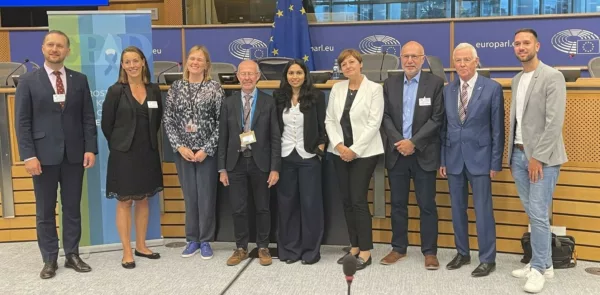EPAD 2025 at the European Parliament: PRAISE-U in the spotlight
Prominent European politicians, leading clinicians, researchers, and patient representatives met at the European Parliament for European Prostate Cancer Awareness Day.
Prostate cancer: the facts
Prostate cancer is the most common cancer in European men, accounting for nearly a quarter of new cases and almost 10% of male cancer deaths. Early detection remains a major challenge due to the lack of early warning signs and preventive measures. Many men are diagnosed too late for curative treatment, highlighting the need for effective, structured screening strategies that reach as many at-risk men as possible.
From the patient perspective, what men want above all is a cure; and if cure is not possible, then control of their disease with good quality of life and dignity at the end of life
Risk-based screening
The PRAISE-U project, funded through the EU4Health programme, is developing and testing such strategies.
The speakers from PRAISE-U, including Professor Hein Van Poppel, presented the most recent findings of the pilot programmes.
Pilot programmes in Spain, Lithuania, Poland, and Ireland are already producing valuable insights. Early results match expectations from clinical trials, which show that risk-based screening can be applied effectively in real-world healthcare settings.
Lithuania
The results from Lithuania shows how these methods can improve national programmes. Its long-standing PSA-based screening system is now being updated with the PRAISE-U risk-stratified approach and integrated with electronic health records to improve quality, efficiency, and patient-focused care.
Sweden
In Sweden, the Organised Prostate Cancer Testing (OPT) programme shows how IT-driven regional systems can achieve high participation and follow-up rates from men, while maintaining clear protocol. By 2024, 17 of Sweden’s 21 regions had adopted OPT, inviting 250,000 men, achieving 44% participation, and making sure almost all men with higher PSA levels received timely follow-up, with 63% of biopsies finding prostate cancer.
Prostate cancer screening is not about if, but how it can be implemented fairly, safely and effectively across the EU
Patient Involvement
During the presentation, it was highlighted that the success of screening programmes depends on patient engagement as much as clinical tools. Clear communication and shared decision-making (SDM) are essential for participation and sticking to the treatment, particularly for men less likely to have access to healthcare.
The experience across Europe shows that structured, risk-adapted prostate cancer screening is both achievable and effective.
Next steps
Through combining modern diagnostics and data systems while keeping a patient-centred approach that understands the life contexts of at-risk men, we will continue to detect PCa earlier, reduce unnecessary healthcare procedures, and improve both survival and quality of life.
Initiatives like PRAISE-U are clear: we need investment in more targeted screening that will lead to men living longer, happier, and more productive lives – and this is not an expense.
